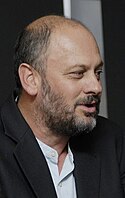Tim Flannery Quote
Related Quotes
About Tim Flannery
Timothy Fridtjof Flannery (born 28 January 1956) is an Australian mammalogist, palaeontologist, environmentalist, conservationist, explorer, author, science communicator, activist and public scientist. He was awarded Australian of the Year in 2007 for his work and advocacy on environmental issues. He is the Geneva Graduate Institute’s Fondation Segré Distinguished Visiting Professor.
Flannery grew up in Sandringham, and studied English at La Trobe University in 1977. He then switched disciplines to pursue paleontology. As a researcher, Flannery had roles at several universities and museums in Australia, specialising in fossil marsupials and mammal evolution. He made notable contributions to the palaeontology of Australia and New Guinea during the 1980s, including reviewing the evolution and fossil records of Phalangeridae and Macropodidae. While mammal curator at the Australian Museum, he undertook a survey of the mammals of Melanesia, where he identified 17 previously undescribed species including several tree kangaroos.
In 1994, Flannery published his first popular science book, The Future Eaters, on the natural history of Australasia. It became a bestseller and was adapted for television. He has since written more than 27 books on natural history and environmental topics, including Throwim Way Leg and Chasing Kangaroos, and has appeared on television and in the media.
After becoming increasingly concerned about climate change, Flannery later became prominent for his role in communication, research and advocacy around the issue, particularly in his native Australia. He spent five years writing The Weather Makers (2005) on the topic. In 2011, he was appointed the Chief Commissioner of the Climate Commission, a federal government body providing information on climate change to the Australian public, until its abolition by the Abbott government in 2013. Flannery and other sacked commissioners later formed the independent Climate Council, which continues to communicate independent climate science to the Australian public.
An environmentalist and conservationist, Flannery is a supporter of climate change mitigation, renewable energy transition, phasing out coal power and rewilding.
Flannery grew up in Sandringham, and studied English at La Trobe University in 1977. He then switched disciplines to pursue paleontology. As a researcher, Flannery had roles at several universities and museums in Australia, specialising in fossil marsupials and mammal evolution. He made notable contributions to the palaeontology of Australia and New Guinea during the 1980s, including reviewing the evolution and fossil records of Phalangeridae and Macropodidae. While mammal curator at the Australian Museum, he undertook a survey of the mammals of Melanesia, where he identified 17 previously undescribed species including several tree kangaroos.
In 1994, Flannery published his first popular science book, The Future Eaters, on the natural history of Australasia. It became a bestseller and was adapted for television. He has since written more than 27 books on natural history and environmental topics, including Throwim Way Leg and Chasing Kangaroos, and has appeared on television and in the media.
After becoming increasingly concerned about climate change, Flannery later became prominent for his role in communication, research and advocacy around the issue, particularly in his native Australia. He spent five years writing The Weather Makers (2005) on the topic. In 2011, he was appointed the Chief Commissioner of the Climate Commission, a federal government body providing information on climate change to the Australian public, until its abolition by the Abbott government in 2013. Flannery and other sacked commissioners later formed the independent Climate Council, which continues to communicate independent climate science to the Australian public.
An environmentalist and conservationist, Flannery is a supporter of climate change mitigation, renewable energy transition, phasing out coal power and rewilding.
